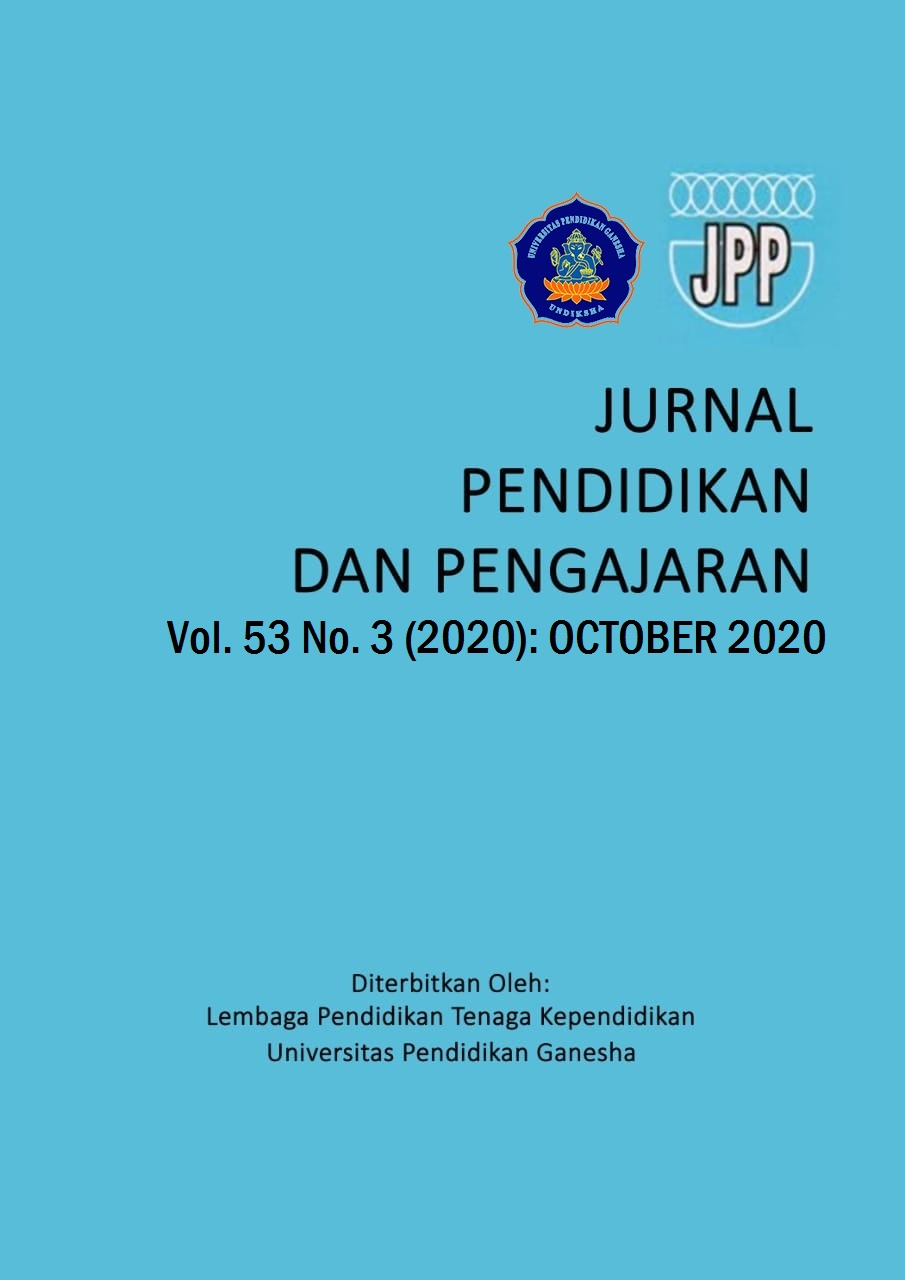Discovery Character Experiment Worksheet on Temperature and Heat Material of Grade X Vocational School
DOI:
https://doi.org/10.23887/jpp.v53i3.26441Keywords:
LKS, discovery learning, character building, scientific attitude, student characterAbstract
Student Worksheet (LKS) is a learning media for experimental activities which as a source of student learning which can provide experiences for students, develop skills, and influence their attitudes. The purpose of this study is to produce a Worksheet Discovery-Character Experiment to hone the scientific attitudes and character of students that are suitable to be used in learning. This research is a 4D development study but only reached the development stage. Data collected in the form of LKS feasibility data from experts (lecturers and teachers). Based on the results of the analysis, it was concluded that the Discovery-Character Experiment worksheet (discovery learning integrated character education) is very feasible to use with an average percentage of 93%. This worksheet is equipped with 3 Temperature and Heat experiment worksheets, concept maps, discussion material, practice questions, and self-evaluation related to students' scientific attitudes and characters. Based on the results of the study, it was concluded that the worksheet was arranged using discovery learning that is integrated in character education at the temperature and heat material of class X vocational high school. Each learning activity which integrated discovery learning can build students’ character and scientific attitude.
References
Ariaji, R., & Abubakar, A. (2017). Pengembangan Lembar Kerja Siswa (LKS) Kimia di SMA/MA Kelas X Terinternalisasi Nilai-Nilai Karakter Siswa. Eksakta : Jurnal Penelitian Dan Pengembangan MIPA, 32, 101–108.
Asmarani, A., & Idrus, I. (2017). Peningkatkan Sikap Ilmiah Siswa Melalui Penerapan Model Discovery Learning. Jurnal Pendidikan Dan Pembelajaran Biologi, 1(1), 16–22.
Berkowitz, M. W., & Simmons, P. E. (2003). Integrating Science Education and Character Education. The Role of Moral Reasoning on Socioscientific Issues and Discourse in Science Education, 19, 117–138. https://doi.org/10.1007/1-4020-4996-x_7
Enggayanti, D. L. (2013). Pengembangan LKS Berbasis Inkuiri Terintegrasi Pendidikan Karakter pada Materi Kalor untuk Siswa Kelas VII SMP RSBI. Universitas Negeri Semarang.
Ghavifekr, S., & Rosdy, W. A. W. (2015). Teaching and learning with technology: Effectiveness of ICT integration in schools. International Journal of Research in Education and Science, 1(2), 175–191.
Gokul, R., & Malliga, T. (2015). A Study on Scientific Attitude among Pre Service Teachers. Research Journal of Recent Sciences, 4, 196–198.
Kaleka, M., & Ika, Y. E. (2018). Developing the Character-Based Students Worksheet of Science with Inquiry Model for Students of Grade IX. Journal of Science Education Research, 2(2), 66–70.
Machin, A. (2014). Implementasi Pendekatan Saintifik, Penanaman Karakter dan Konservasi pada Pembelajaran Materi Pertumbuhan. Jurnal Pendidikan IPA, 3(1), 28–35.
Marjito, E. R., & Rizki, K. (2019). Pengaruh Penerapan Model Pembelajaran Inside Outside Terhadap Hasil Belajar Siswa Kelas X SMAN 1 Sungai Raya Kabupaten Kubu Raya. Psikologi Perkembangan, October 2013, 1–224. https://doi.org/10.1017/CBO9781107415324.004
Masfufah, A. S., & Mahardika, A. I. (2015). Hubungan Keaktifan Penggunaan Media Sosial terhadap Hasil Belajar Fisika Siswa Kelas X dan XI IPA di SMA Negeri Banjarmasin. Berkala Ilmiah Pendidikan Fisika, 3(3), 230–241.
Mayasari, H., Syamsurizal, & Maison. (2015). Pengembangan Lembar Kerja Siswa (LKS) Berbasis Karakter melalui Pendekatan Saintifik pada Materi Fluida Statik untuk Sekolah Menengah Atas. EduSains, 4, 30–36.
Nasar, A., & Kaleka, M. B. U. (2019). Effectiveness of Experimental Laboratory Methods on Understanding the Concept of Light , Science Processes Skills , And Scientific Attitudes of Students. Jurnal Pendidikan Fisika Universitas Muhammadiyah Makassar, 7(3), 262–270.
Patrianingsih, E. A., & Kaseng, E. S. (2016). Model Pembelajaran Discovery Learning , Pemahaman Konsep Biologi, dan Sikap Ilmiah Peserta Didik. Jurnal Penelitian Pendidikan Insani, 19(2), 74–86.
Ristiyani, D. (2014). Pengembangan LKS Fisika Materi Pemantulan dan Pembiasan Cahaya Terintegrasi Karakter dengan Pendekatan Saintifik. Universitas Negeri Semarang.
Sartiyah, S., & Yulianti, D. (2015). Pengembangan LKS Fisika Materi Kalor dan Perubahan Wujud Bermuatan Karakter dengan Pendekatan Scientific. Unnes Physics Education Journal, 4(1), 54–61.
Singh, U., & Mishra, P. (2014). Study of Scientific Attitude Of B.Ed. And B.Ed. (Special) Pupil Teachers. Scholarly Research Journal for Interdisciplinary Studies, II, 1815–1822.
Sintia, R., Abdurrahman, & Wahyudi, I. (2015). Pengembangan LKS Model Discovery Learning Melalui Pendekatan Saintifik Materi Suhu dan Kalor. Jurnal Pembelajaran Fisika, 3, 125–134.
Sujana, A., & Jayadinata, A. K. (2018). Pembelajaran Sains di Sekolah Dasar (A. A. Syahid (ed.); 1st ed.). UPI Sumedang Press.
Supriyadi, E. (2015). Pendidikan dan Penilaian Karakter di Sekolah Menengah Kejuruan. Jurnal Cakrawala Pendidikan, 2. https://doi.org/10.21831/cp.v0i2.7590
Thiagarajan, S., Semmel, D. S., & Semmel, M. I. (1974). Instructional Development for Training Teachers of Exceptional Children: A Sourcebook. Center for Innovation in Teaching the Handicapped.
Trumper, R. (2002). What Do We Expect From Students ’ Physics Laboratory Experiments ? Journal of Science Education and Technology, 11(3), 221–228. https://doi.org/10.1023/A:1016016417872
Zulirfan, Iksan, Z. H., Osman, K., M, S. N., & Moh, S. (2017). Take-Home-Experiment : Enhancing Students’ Scientific Attitude. Journal of Baltic Science Education, 828–837.
Downloads
Published
How to Cite
Issue
Section
License
Authors who publish with Jurnal Pendidikan dan Pengajaran agree to the following terms:- Authors retain copyright and grant the journal the right of first publication with the work simultaneously licensed under a Creative Commons Attribution License (CC BY-SA 4.0) that allows others to share the work with an acknowledgment of the work's authorship and initial publication in this journal
- Authors are able to enter into separate, additional contractual arrangements for the non-exclusive distribution of the journal's published version of the work (e.g., post it to an institutional repository or publish it in a book), with an acknowledgment of its initial publication in this journal.
- Authors are permitted and encouraged to post their work online (e.g., in institutional repositories or on their website) prior to and during the submission process, as it can lead to productive exchanges, as well as earlier and greater citation of published work. (See The Effect of Open Access)





